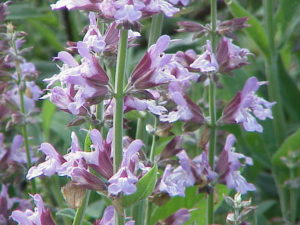Sage
 There are many varieties of sage that grow readily in our gardens, the most common being Salvia Officinalis, the Common Sage, also known as Dalmatian Sage. These flat, soft leaves were considered to be sacred by the Romans and used to scent their hair, their bodies, their clothes and their baths. Native Americans also honored this herb and would burn it to cleanse an area of unwanted energies. In modern times, our pharmaceutical companies widely use this fragrance in mouthwashes, gargles, soaps, shampoos, detergents and in men’s colognes.
There are many varieties of sage that grow readily in our gardens, the most common being Salvia Officinalis, the Common Sage, also known as Dalmatian Sage. These flat, soft leaves were considered to be sacred by the Romans and used to scent their hair, their bodies, their clothes and their baths. Native Americans also honored this herb and would burn it to cleanse an area of unwanted energies. In modern times, our pharmaceutical companies widely use this fragrance in mouthwashes, gargles, soaps, shampoos, detergents and in men’s colognes.
As an essential oil, sage is steam distilled from the dried leaves of the salvia plant and has many therapeutic qualities. Considered antiseptic, sage oil can be used in an aroma lamp to disinfect a sick area and contain respiratory infections by killing the germs that float in the air. It also seems to be beneficial for asthma sufferers as it calms the respiratory tract and allows greater expansion of the lungs. This oil is also a bactericide, which when added to mouthwashes can help ease canker sores and inflamed gums.
One of the benefits of sage is that it is a great diuretic and reduces fluids throughout the body. It can reduce oil production in skin and is therefore good for acne and other skin complaints. It reduces oil production in hair and gives body and shine to limp hair. Sage alleviates premenstrual fluid to help relieve edema and it generally reduces most secretions including mucus, catarrh and perspiration.
Sage activates the nervous system by stimulating the adrenal cortex and is said that sage can help reduce hot flashes by regulating the functioning of the adrenal cortex. This also aids menstrual difficulties and depression associated with menopause.
By supporting the nervous system, sage can reduce mental fatigue, stress and mental exhaustion. A little sage can be emotionally uplifting at times, though in larger doses has the opposite effect and becomes sedating. In small doses, sage can relieve giddiness and light-headedness, but in larger doses, it can cause vertigo and a sense of instability. So, sage comes with a warning-- use it sparingly and avoid overuse (as with most oils, too much can be toxic).
Some other uses of sage essential oil are as an insecticide since it takes away the swelling and pain of stings and bites. As a fungicide, putting neat sage on athlete’s foot is very beneficial (as is tea tree). Sage can also be used as a digestive aid for stomach complaints.
As mentioned earlier, sage has been grown by Native Americans not only for culinary purposes but also for rituals and ceremonies. Some made smudge sticks with dried sage, though commonly the Native Artemisia sp. plant was used, and these smudge sticks would it cleanse an area of unwanted negative energies or to cleanse the aura of a person. This helped restore and balance energy to the body and mind and to the environment.
So, think about growing your own sage and making sage sticks of your own. Otherwise you can burn sage essential oil in an aroma lamp for similar uplifting and focusing effects.
aromatherapy, essential oil, essential oils, sage, sage essential oil, essential oils for respiratory problems, essential oils for infections, essential oils for mouth problems, essential oils for acne, asthma, essential oils for asthma, essential oils for hot flashes, essential oils for skin complaints, essential oils for menstrual problems, oils to uplift, essential oils for exhaustion
